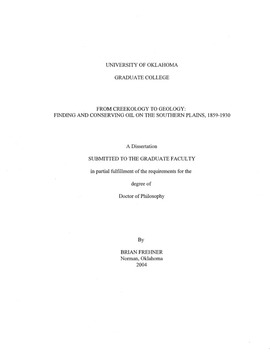| dc.contributor.advisor | Pisani, Don, | en_US |
| dc.contributor.advisor | Hurtado, Al, | en_US |
| dc.contributor.author | Frehner, Brian. | en_US |
| dc.date.accessioned | 2013-08-16T12:20:51Z | |
| dc.date.available | 2013-08-16T12:20:51Z | |
| dc.date.issued | 2004 | en_US |
| dc.identifier.uri | https://hdl.handle.net/11244/1230 | |
| dc.description.abstract | This dissertation tells the story of the oil industry's westward migration from Pennsylvania to the Southern Plains states of Kansas, Oklahoma, and Texas and how different environments in these regions influenced prospectors' methods for finding oil. Petroleum engineers, geologists, and businessmen take center stage throughout the narrative, and I emphasize how their biases, values, and interests influenced the kind of knowledge produced. At the heart of this story lay a contest between professional, university-trained engineers and geologists and so-called practical oil men, or "wildcatters, " who received their training less formally from surveying the landscape. Although both groups performed field work in their search for oil, I explore how each learned very different information from that activity. Wildcatters met with so much success that the oil industry failed to take geologists seriously for approximately fifty years after 1860 when the Pennsylvania oil boom started, and I argue that the environment played an important role in this contest for authority between oil prospectors who learned their trade through hands-on experience and those who learned it primarily in the classroom. I continue this theme by showing how the environment actively influenced the growing acceptance of geologists as the oil industry migrated west and companies with interests in Kansas, Oklahoma, and Texas began hiring geologists and establishing their own geological research departments. A pioneer in the use of geology, Henry L. Doherty, controlled Cities Service holding company and dispatched an army of geologists who discovered significant oil strikes in these states. Doherty's embrace of university-trained experts led him to advocate conservation of oil on the basis of geological and engineering principles. Practical men in Oklahoma, however, recognized the need for conservation even earlier and succeeded in lobbying their state legislature for laws which proved effective long before geologists and engineers entered the industry en masse. I show how the political battle over conservation between practical men and petroleum engineers and geologists underscores the complex and decades-long relationship between the oil industry and the natural world. | en_US |
| dc.format.extent | iv, 273 leaves ; | en_US |
| dc.subject | Lesley, J. P. (J. Peter), 1819-1903. | en_US |
| dc.subject | Petroleum Prospecting United States History. | en_US |
| dc.subject | Energy. | en_US |
| dc.subject | Petroleum Geology United States History. | en_US |
| dc.subject | History, United States. | en_US |
| dc.subject | Petroleum conservation Oklahoma History. | en_US |
| dc.subject | Gould, Charles Newton, 1868-1949. | en_US |
| dc.title | From creekology to geology: Finding and conserving oil on the Southern Plains, 1859--1930. | en_US |
| dc.type | Thesis | en_US |
| dc.thesis.degree | Ph.D. | en_US |
| dc.thesis.degreeDiscipline | Department of History | en_US |
| dc.note | Advisers: Al Hurtado; Don Pisani. | en_US |
| dc.note | Source: Dissertation Abstracts International, Volume: 68-06, Section: A, page: 2615. | en_US |
| ou.identifier | (UMI)AAI3270678 | en_US |
| ou.group | College of Arts and Sciences::Department of History | |
